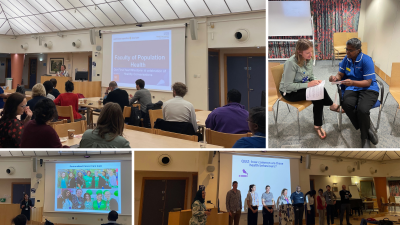
Funded by the Royal Free Charity, the faculty was designed to empower staff and patients to have conversations to live well, improve their health and prioritise prevention of long-term conditions.
In its first year, the faculty has upskilled almost 2,000 staff to enable them to initiate conversations with patients about health behaviours including quitting smoking, reducing alcohol intake, physical activity and maintaining a healthy weight.
The impact of having these healthy conversations took centre stage at the half-day milestone event, which featured discussions on the next steps for the programme, practical workshops and even exercise bingo.
Group chief executive Peter Landstrom opened the session: “The faculty of population health is a great example of how we're focussing on improving our population health and reducing the unfortunately persistent health inequalities that occur across north London.
“We have a unique position to impact the patients and families we care for, but also the wider population and our partners. Our faculty and the work we have done is a key resource for the Royal Free London and north central London.”
Gillian Smith, group chief medical officer, thanked the faculty for their progress so far: “The faculty is our approach to make sure population health and prevention is embedded as our cultural norm. We’ve got great initiatives that have taken place over the last year, and I want to thank everyone who has been involved in these.”
Judith Stanton, director of population health, spoke about the impact healthcare professionals can have on improving population health: “We know that when patients come into hospital that it’s a teachable moment. Being able to take that opportunity is really important – for example, we have an 85% quit rate for smoking in our respiratory clinics.
“If we take this approach with all of our patients, we can start to reduce diseases and long-term conditions. This has a huge impact for our population and on reducing health inequalities, and that’s what the faculty is all about.”
The population health team highlighted the success of their staff training model, which has seen them facilitate educational roadshows in wards across our hospitals. Throughout the year, the team has also delivered expert-led training on healthy conversations, comprising of theory and practical experience.
At the milestone event, Macmillan personalised cancer lead Azmina Rose and active hospitals lead Maria Goddard shared how the personalised cancer team and Royal Free Charity volunteers completed the training earlier this year.
Azmina said: “It’s important to realise it is never too late to share this information with patients – by doing things like stopping smoking and reducing alcohol intake, cancer patients can reduce the impact of treatment side effects and the risk of the cancer coming back. Even after diagnosis, it’s essential for us to motivate them to adopt a healthy lifestyle. We also have the potential to reach many more people beyond the patients we’re clinically responsible for, such as their family members.”
The faculty plans to continue delivering sessions for teams interested in healthy conversations training. Next steps for the programme also include setting up a community of practice network which will meet monthly to receive support from the population health team.
Population health is one of the key principles underpinning the Royal Free London's clinical strategy, which outlines how we will bring the best of the NHS to every patient. By improving our population's health, we can improve the lives of our communities and prevent long-term conditions. Read more about our clinical strategy.
 Translate
Translate